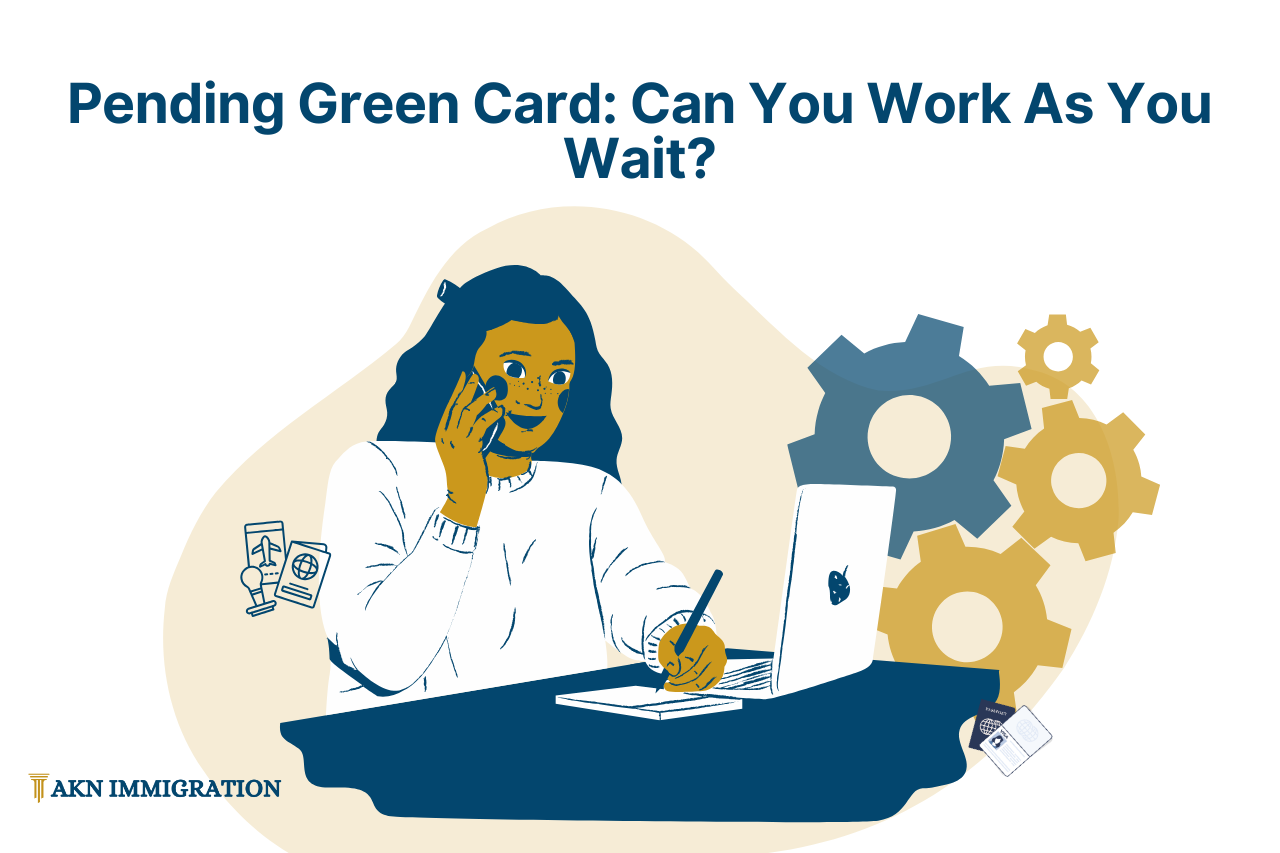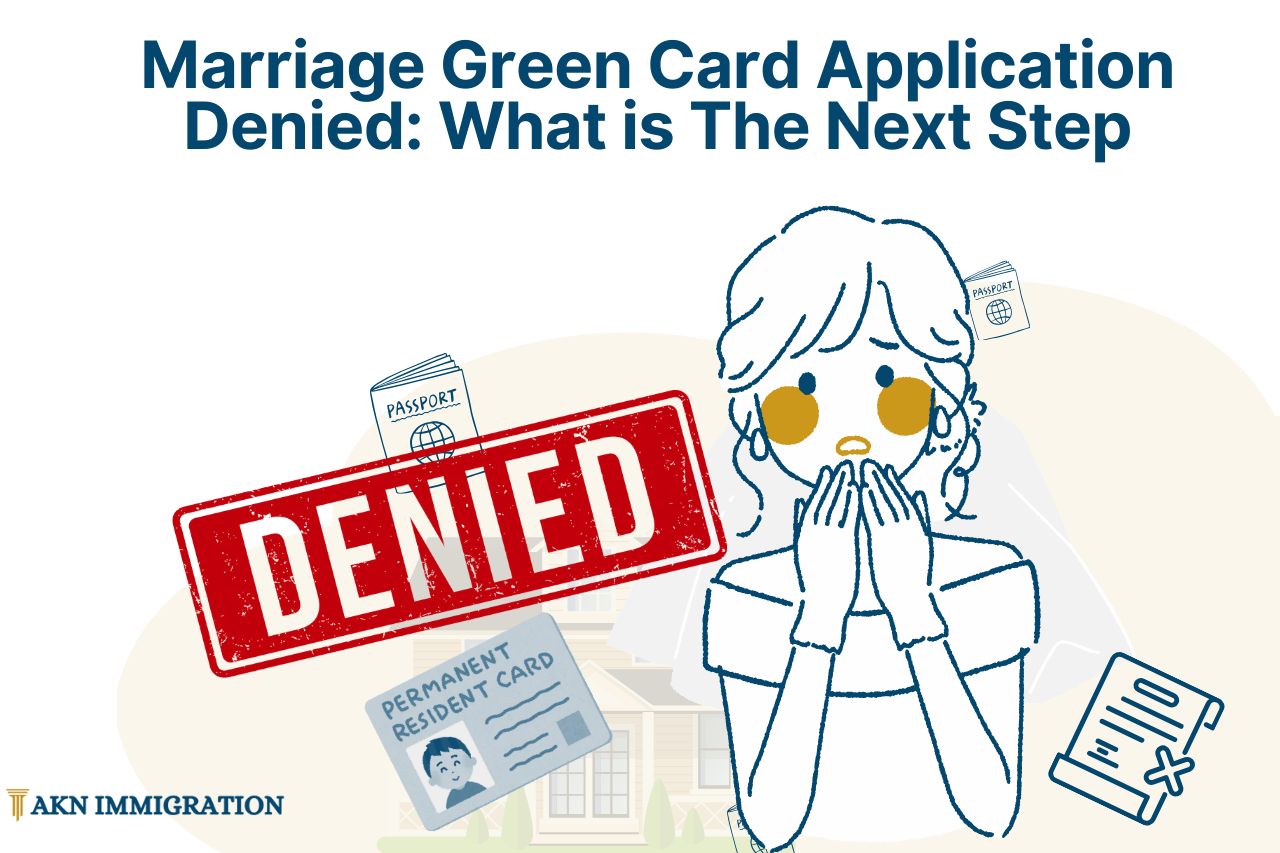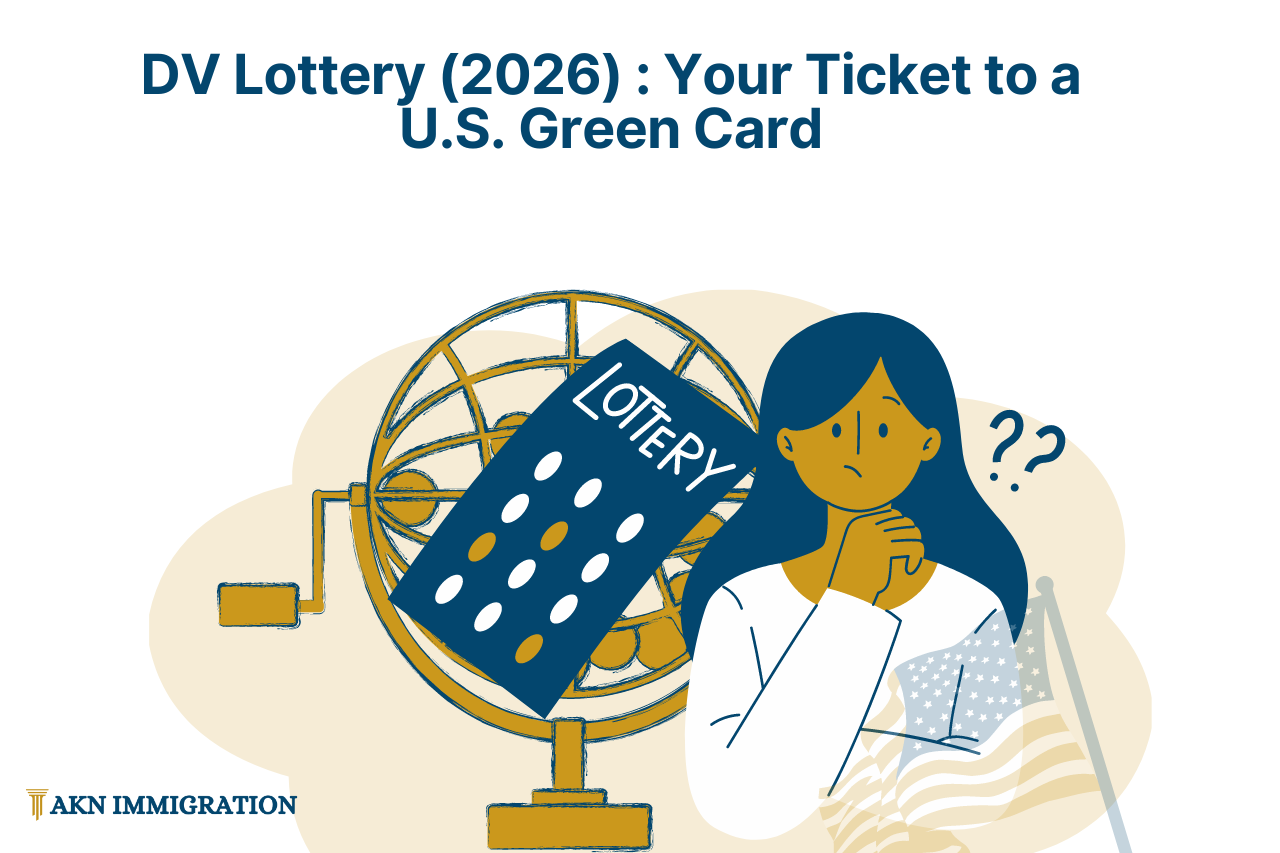The Violence Against Women Act (VAWA) stands as a crucial legal framework aimed at shielding individuals from domestic violence and abuse. Despite its name, VAWA extends far beyond gender-specific boundaries, providing vital protections to anyone who has suffered abuse from a U.S. citizen or lawful permanent resident. This legislation acknowledges that domestic violence can occur in diverse relationships beyond marriage, empowering victims to pursue relief and immigration benefits irrespective of their relationship status with the abuser. Meeting VAWA Visa Requirements is essential for those seeking protection under this act.
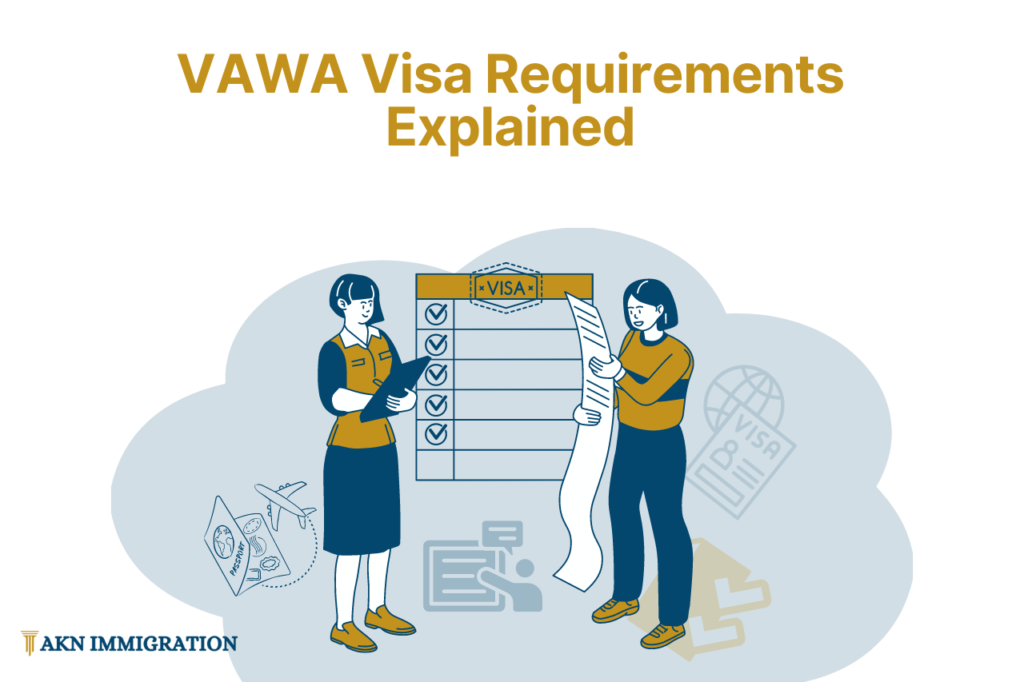
Hello. I’m Aisha Nanyanzi, an immigration attorney who helps domestic violence victims secure their immigration status through VAWA petitions. I am passionate about advocating for survivors and ensuring they have the legal support needed to navigate the complexities of VAWA and achieve safety and stability in the United States. If you or someone you know has experienced domestic violence and needs assistance with a VAWA petition, please reach out to me here. Let’s dive into the VAWA visa requirements.
As a general overview. To qualify for VAWA, you must meet these five (5) main requirements:
- You must be in a qualifying relationship with an abusive U.S. citizen or lawful permanent resident.
- To qualify for VAWA, reside in the U.S. at filing and lived with the abusive U.S. citizen or LPR.
- The abusive person must be a U.S. citizen or lawful permanent resident.
- You must have suffered abuse at the hands of the U.S. citizen or lawful permanent resident.
- You must demonstrate good moral character.
In the guide below, we will explain each of these five requirements in more detail.
Qualifying Relationship as Part of The VAWA Visa Requirements
The “qualifying relationship” requirement under VAWA refers to specific types of relationships that can serve as a basis for seeking immigration benefits due to abuse from a U.S. citizen or lawful permanent resident (LPR).
To qualify for relief under VAWA, you must demonstrate one of the following qualifying relationships with the abusive U.S. citizen or LPR:
- Spousal Relationship: This category pertains to individuals married to a U.S. citizen or lawful permanent resident. To qualify, you must demonstrate that the marriage is genuine and bona fide, not solely entered into for immigration purposes.
- Parent-Child Relationship: Another qualifying relationship is being the child of a U.S. citizen or lawful permanent resident. To establish eligibility, you must prove the parent-child relationship through legal documentation or other evidence confirming the familial bond.
- Parent of an Abusive U.S. Citizen: This category applies to individuals who are parents of an abusive U.S. citizen child who is at least 21 years old. It recognizes that parents can also be victims of abuse perpetrated by their adult U.S. citizen children.
hese familial connections form the basis for seeking immigration benefits under VAWA due to abuse from a U.S. citizen or lawful permanent resident. Each relationship has specific evidentiary requirements to demonstrate eligibility for relief under VAWA.
To meet VAWA visa requirements, do you need to reside in the U.S.
Residing in the U.S. at the Time of Filing: You do not need to be physically present in the United States when filing the VAWA petition. This requirement does not apply if you can demonstrate extreme cruelty or battery by the abusive U.S. citizen or lawful permanent resident (LPR) while outside the U.S.
Additionally, if the abusive individual is a U.S. government employee or a member of the uniformed services, this condition may also be satisfied.
To qualify for VAWA, you must have lived with the abusive U.S. citizen or LPR, establishing the necessary familial or household relationship.
Meeting the residence requirement strengthens ties to the United States and the abusive relationship for VAWA protection.
The abusive person must be a U.S. citizen or lawful permanent resident.
To qualify for VAWA, the abusive person must be a U.S. citizen or lawful permanent resident. However, there is an exception: if the abusive individual previously held U.S. citizenship or LPR status but lost that status, you may still qualify for VAWA by filing your petition within two (2) years of their loss of status, provided the loss was related to domestic violence.
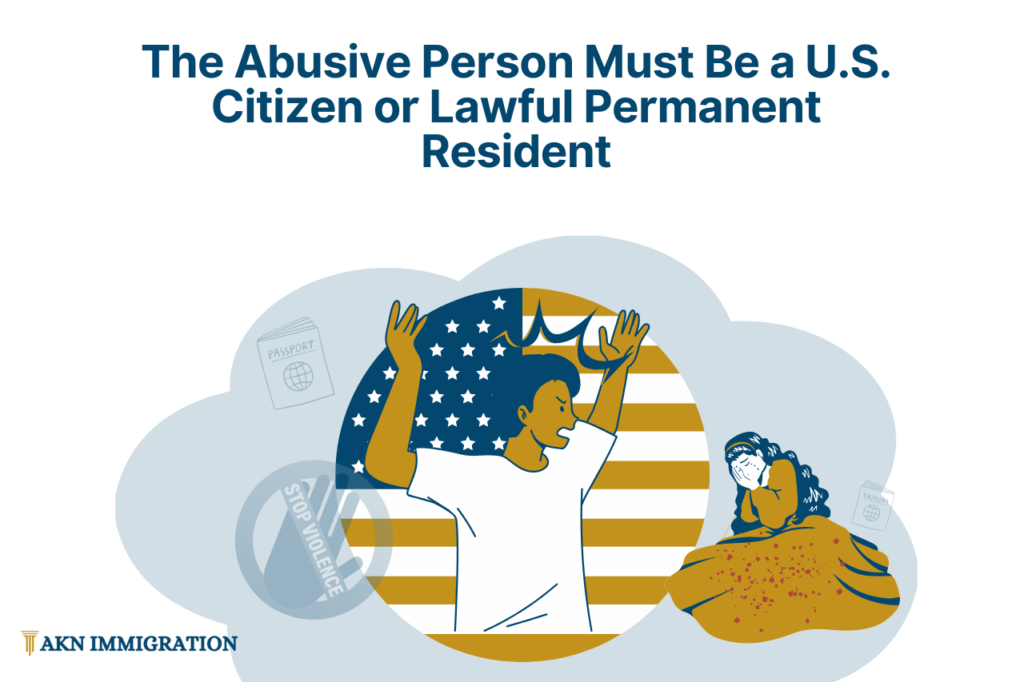
You Must Have Suffered Abuse at the Hands of a U.S. Citizen or Lawful Permanent Resident
Abuse can include physical violence, emotional or psychological abuse, sexual assault, rape, incest, forced prostitution, or other mistreatment. Evidence supporting your claim of abuse may include:
- Police reports documenting incidents of violence or domestic disturbance.
- Medical records detailing injuries sustained as a result of abuse.
- Counseling or therapy records indicating trauma-related symptoms.
- Affidavits or statements from witnesses who observed the abuse.
- Photographs of injuries or property damage caused by the abuser.
- Records of calls made to domestic violence hotlines or shelters.
- Legal documentation, such as restraining orders or court records related to the abuse.
Comprehensive evidence strengthens your case when applying for VAWA relief and helps paint a clearer picture of the abuse endured.
We can use so much more, and we are always available to look at your case and make an assessment.
You Must Demonstrate Good Moral Character
To qualify for VAWA, you must demonstrate good moral character for the three years before filing your VAWA petition.Good moral character is assessed based on various factors, including:
- Avoiding any criminal activities or convictions during the relevant period.
- Maintaining stable employment and meeting financial obligations.
- Involvement in community activities, volunteering, or charitable work.
- Positive relationships with family, employers, teachers, or religious leaders.
- Completion of rehabilitation programs or demonstrating a commitment to personal growth.
Demonstrating good moral character is crucial for VAWA eligibility and showing responsibility and upstanding behavior in society.
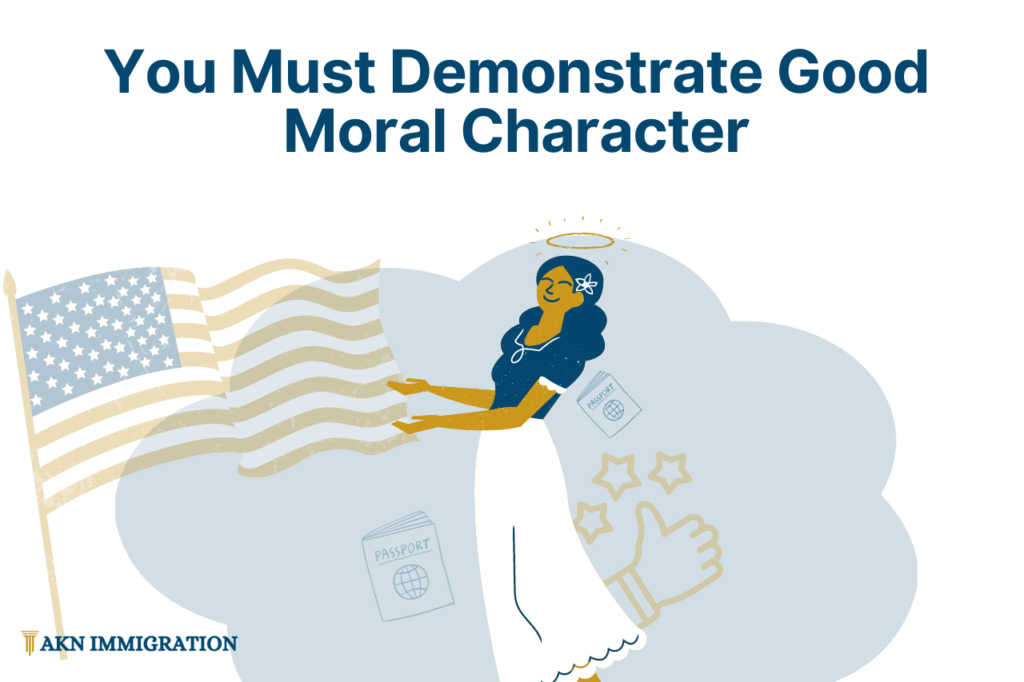
In conclusion, navigating the VAWA visa requirements may seem daunting; nevertheless, you can go through this process with others. At AKN Immigration we specialize in VAWA petitions and are dedicated to simplifying this journey for you. If you need assistance or have questions about your eligibility for VAWA relief, please don’t hesitate to Contact Us.

